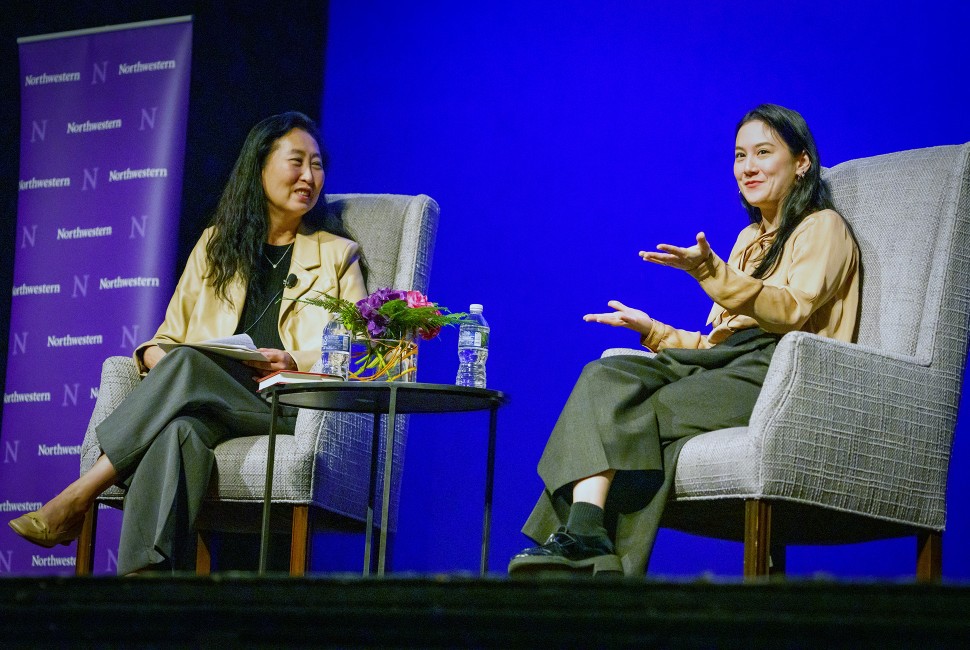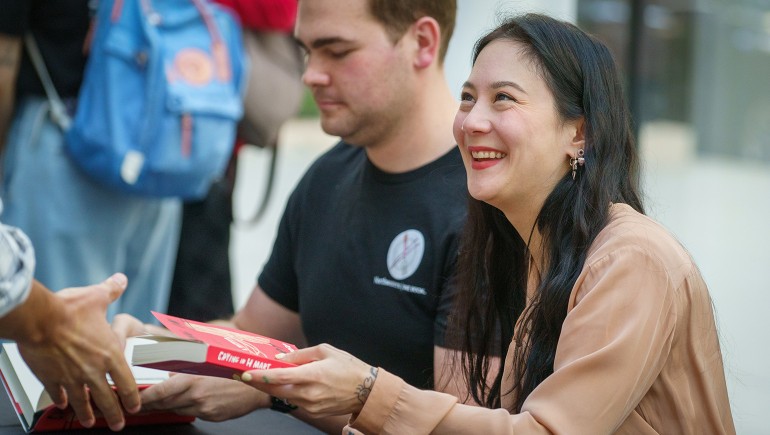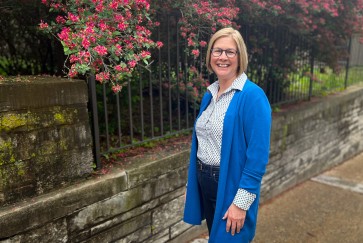Musical artist and author Michelle Zauner welcomed star-struck packed houses on both Evanston and Chicago Northwestern campuses on Wednesday to share thoughts about this year’s One Book selection, “Crying in H Mart.”
Zauner spoke to approximately 1,250 students, faculty and staff about her New York Times bestselling memoir, which explores grief and identity through a complex mother-daughter relationship. Zauner is also the lead vocalist and guitarist for Japanese Breakfast, a Grammy-nominated alternative pop band, and received thunderous applause and cheering as she came onstage.
“Many people can relate to the story and have a personal and intense feeling toward their relationship with their mother or mother figure,” Zauner told Northwestern Now. “When you write for yourself, you end up writing for so many people.”
The talks had a Q&A format and were moderated by history professor and One Book One Northwestern faculty chair Ji-Yeon Yuh, who teaches Asian American history and Asian diasporas, race and gender, and oral history.
Northwestern University Feinberg School of Medicine faculty Clyde Yancy, the vice dean for diversity and inclusion and chief of cardiology, welcomed the group on the Chicago campus. He spoke of the importance and need for us to join together in community during these difficult times.
When you write for yourself, you end up writing for so many people.”
“This is the first time an Asian American author has been chosen for One Book,” Yuh said. “It was an honor to be the faculty chair.”
In addition to Korean identity, the pair talked about food, music, “escaping the grief-girl narrative” and plans for her second book, which Zauner will write as she takes a musical hiatus to live in Seoul, South Korea, her mother’s hometown, where the two traveled together when Zauner was a child and where her aunt still lives.
Zauner’s parents met in Seoul in the early 1980s, they married and settled in Eugene, Oregon, where the author returned as an adult to care for her mother, Chongmi, through rounds of chemotherapy. While their relationship was often fraught, tested by cultural contradictions that left Zauner feeling “lost in translation,” mother and daughter found common ground and joy in Korean food.
Zauner shared with the audience that the day of her visit to Northwestern, Oct. 18, marked nine years since her mother’s death. She spoke to the “deep need” she felt to write the book following her mother’s death, even though it took her five years — and lots of revisions — to complete.
“I think it needed to be that raw in a way — that’s just what that book is,” Zauner said. “And I think in a way, I'll always be writing about her and there will be a different version of it that’s more collected and thoughtful and less like, emotionally ragged, but I'm really glad that I have a document of that time.”
Music has also helped Zauner process loss, particularly in her shift from “grief-girl music” in her earlier albums to the latest album, “Jubilee,” which offers more joy and delight. Music helped her “create a sense of belonging” in a world she felt disconnected from at times as a Korean American growing up.
In his introductory remarks at Zauner’s Evanston campus discussion, University President Michael Schill commented that reading the book was a surprisingly personal experience, having recently lost his mother. As University of Oregon president, he also lived in in Eugene for seven years before arriving in Evanston.
“I shopped in the Sunrise Market, I drove on the same streets you describe as you went back and forth, and I lost my mother a few years ago,” Schill said. “Parts of the book really moved me and from them brought even more memories of my life to the front of mind.”



